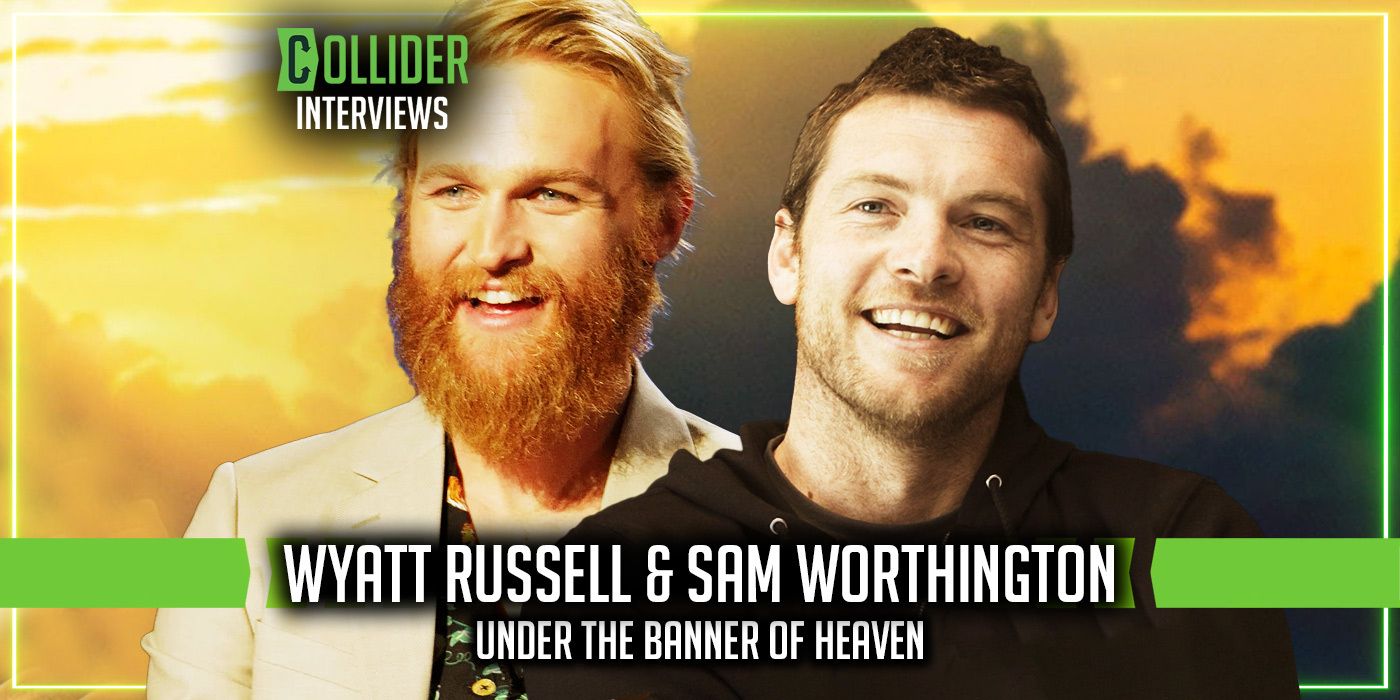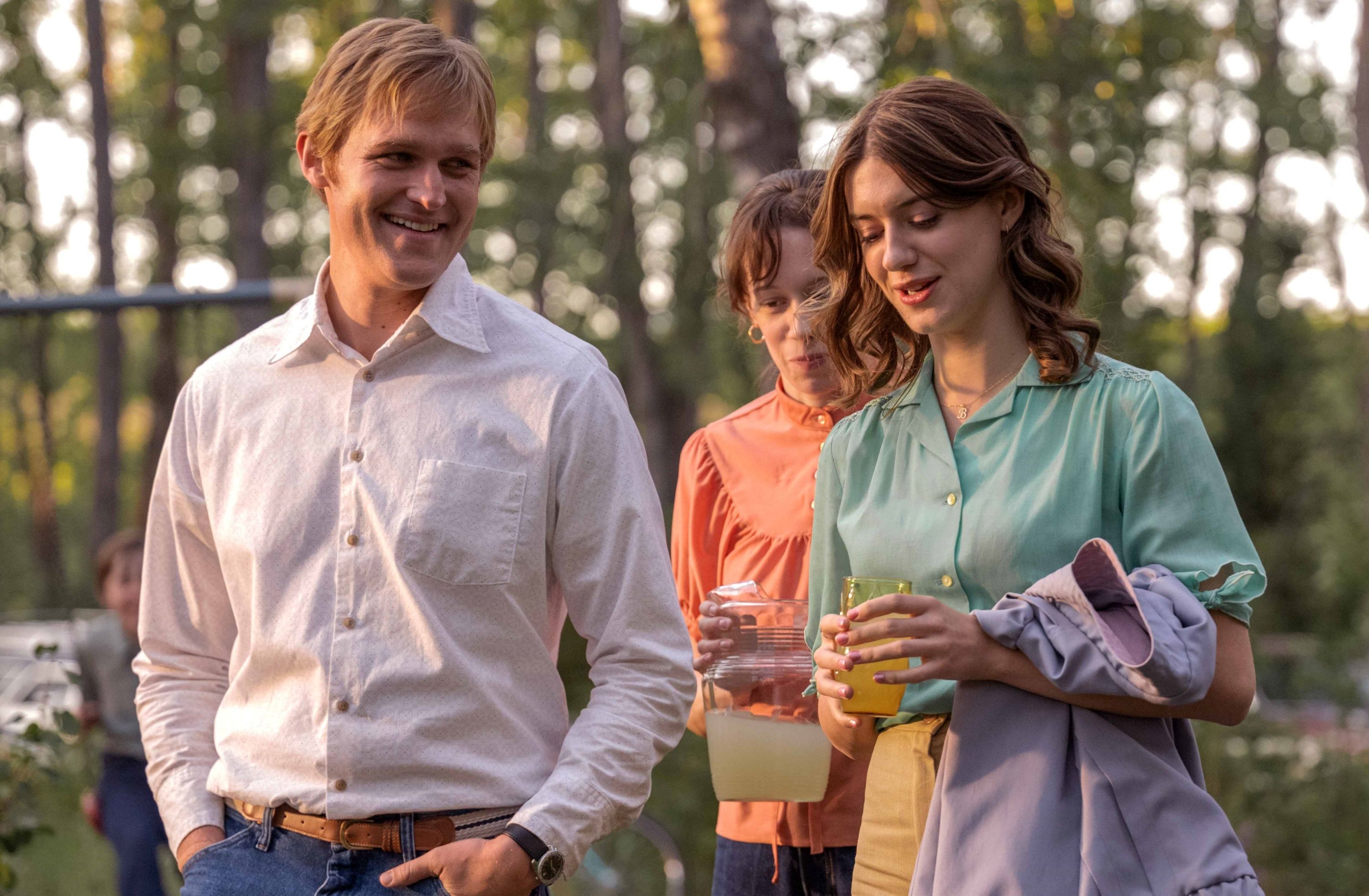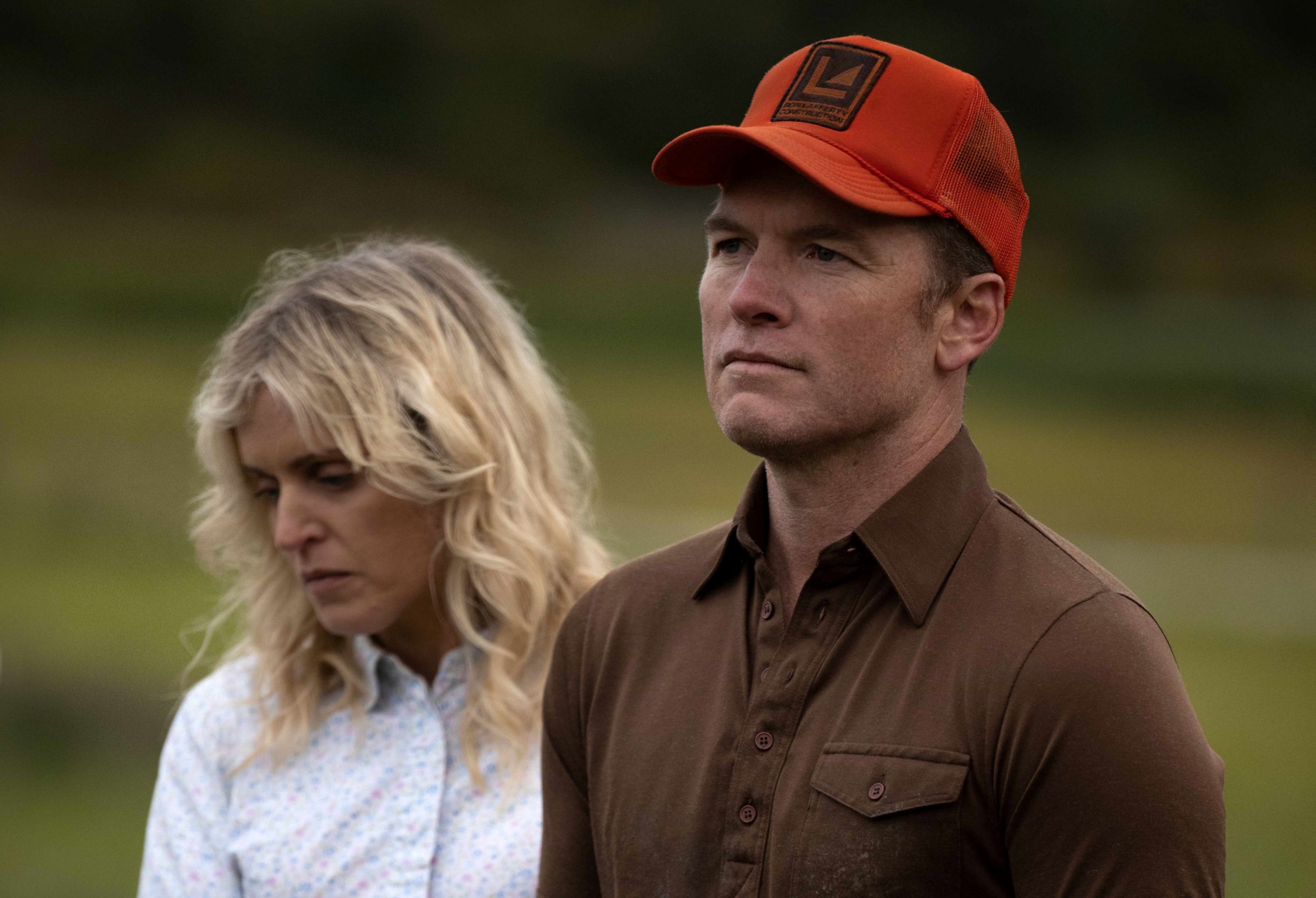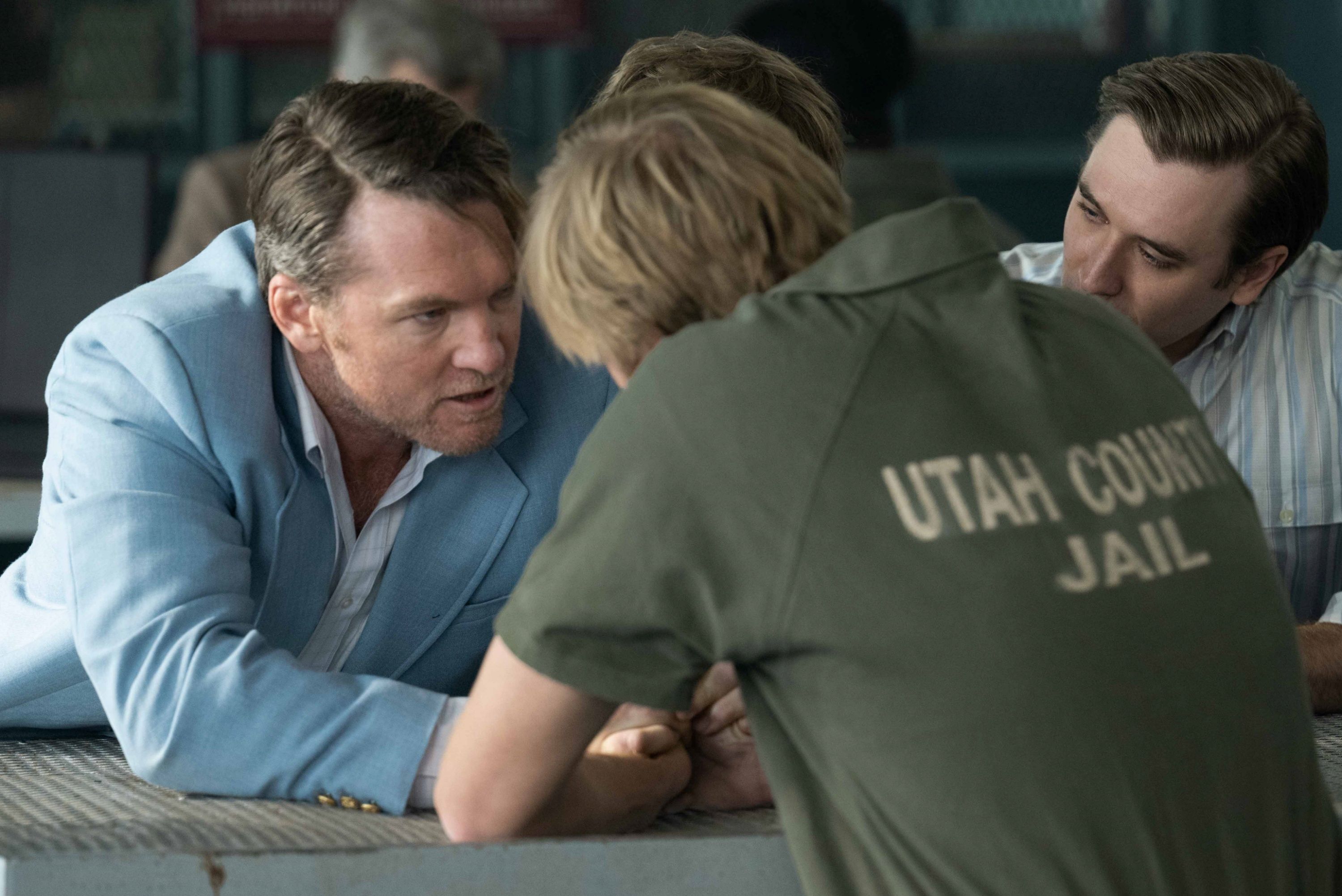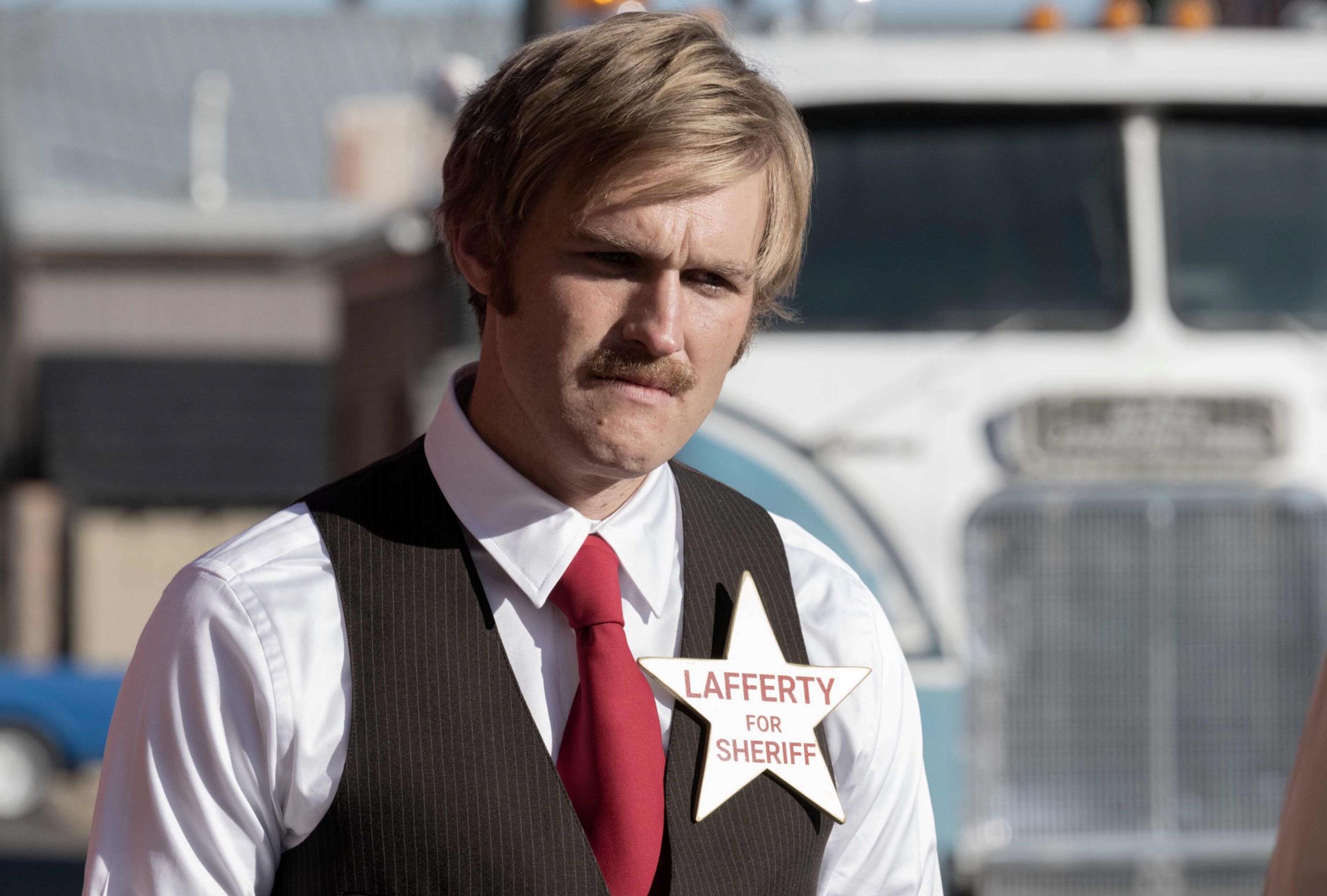[Editor’s note: The following contains some spoilers for the real-life crime explored in Under the Banner of Heaven.]From creator/showrunner/executive producer Dustin Lance Black and inspired by the true crime bestseller by Jon Krakauer, the limited series Under the Banner of Heaven (which is from FX and can be streamed on Hulu) follows Detective Jeb Pyre (Andrew Garfield), a devout member of the LDS Church, and his seasoned partner Bill Taba (Gil Birmingham). Investigating a prominent Mormon family for the role they played in a horrific crime weighs deeply on Pyre, as he also questions his own faith in ways that he never could have expected.
During this interview with Collider, Wyatt Russell and Sam Worthington, who play brothers Dan and Ron Lafferty, two members of that aforementioned prominent Mormon family, talked about what intrigued them about this project, the challenges of playing these characters, exploring the motivations behind their actions, bonding as a cast, being sensitive to this horrifically tragic true story, and what the first thing was that they did once filming had ended.
Collider: Terrific work in this. Actors often talk about wanting to take on projects and characters that scare them, in some way. Was this one of those projects for you?
SAM WORTHINGTON: I think what scared me was actually just working with [Dustin Lance Black] and Andrew [Garfield]. When you’re working with people the caliber of Ron Howard, you’ve gotta step up and not let the team down. To be honest, with any true story, you’ve got a lot of responsibility to the people that were involved and their families. Hopefully, we are handling the tragic tale of Brenda with some sensitivity and delicacy, in order to give her respect and honor. That’s the scariest thing about this. Hopefully, we did an okay job, for her and her family.
WYATT RUSSELL: I don’t know if Dan scared me, to be honest. I was interested in how a person could go down that path, when seemingly they were a person who should have been helping people and doing good for their community and the people around them. Dan’s a very magnetic guy. He’s a nice guy, oddly. You’d think that he’s got all this horrible vitriol, but it doesn’t come out. It’s not something that he really makes a part of himself. It is obviously there and deeply seated, at his core, but it was an odd thing, as to how did it get there. That’s what really drew me. I thought, “How did this get to that point for this guy?” Going down that rabbit hole was an interesting place to start from.
Do you feel like you got a definite answer as to how he got to where he got, or does that feel like something that isn’t ever really knowable completely?
RUSSELL: I feel like that is something that’s never knowable completely because, to do what he did, I don’t think that’s something anybody can really understand. Honestly, it’s a bridge too far for me. But in terms of how someone can get there, I do think that Dan was filled with so much love for his family that it created a massive amount of fear that, whatever doubt crept into his mind, that he wasn’t gonna see them in the afterlife. He felt like these sins and these little things that he had done wrong were gonna catch up to him, and he needed to go and live as pure as he possibly could, so that he could get to the afterlife. Through that journey and being driven by fear, that’s how he ended up in the place that he ended up in. If you leave the Mormon church, in their faith and the way they practice it, no one will talk to you again. You lose your family completely. And for someone who loves their family as much as Dan did, it’s a very scary reality to feel like he was gonna lose his family in the afterlife. He didn’t care about life [in the present]. He didn’t care about what was going on [in the present]. He probably does, but he thinks he’s the prophet Elijah and the world’s gonna end. What’s the point of what’s going on now? It’s all about the afterlife? And if you fear that you’re not gonna see your loved ones in the afterlife, it’s scary what you’ll do.
Sam, there’s definitely a journey that your character takes in this. He isn’t the way he ends up, at the beginning of this story. Were there aspects of him that you enjoyed digging into and exploring, especially with some of the earlier scenes, where we really get to see him with his family?
WORTHINGTON: With the character of Ron, he’s a devoted family man, not only with his own family, but the bigger Lafferty family, as well as the Mormon community. It’s that love and drive and compulsion to do right by everybody, in the way that we portrayed it, that can lead to his downfall. Those roles are always enjoyable because it’s about holding onto something dear to him.
What did you do for your own preparation and to get into his mindset? With something like this, it seems like you could go down rabbit holes, so how do you know where to stop?
WORTHINGTON: It’s all a journey. It’s all about discovery. That’s what I looked at. I always yielded back to Lance, if I had any questions about the faith or the character. He’s had the story for over 10 years, and he’s had the idea of how to put this together for 10 years, so he was always the source that I went back to. But in regards to when we were putting it together, that’s the fun bit. Each scene should be a discovery that leads to the next scene, and then you’re hopefully on the right path to tell it truthfully.
The Lafferty family, especially these brothers, almost feel like one serpent with different heads. Some of them are more dangerous and vicious than others, but they’re all co-dependent on each other. What was it like to form that dynamic, as characters and as actors, and most specifically between Dan and Ron?
WORTHINGTON: Actors are like a band of gypsies. You have that bond when you start filming, and it becomes a trust, which lends itself to the brotherhood of the story. That was an interesting dynamic, from the beginning. It’s not like we all sat down and discussed each brother’s role in the family. We didn’t do that. We all came at it from our own points of view, and then hopefully that worked. You yield to Lance or the other directors to keep you in line.
RUSSELL: It was really interesting because it happened organically. Before we came on set, we had a lot of time together, prior to the first day of shooting. There were rehearsals and there was hanging out together getting to know each other, just as people. That obviously helps with the feeling of collaboration that goes into making a show like this. There are a lot of actors and a lot of different personalities that all need to be heard, so getting that out of the way was really great. Working with Sam [Worthington] was really wonderful. He was very available and very giving. He was so into it and loved all aspects of the job and what we were doing. He was dedicated, and easy to play off of and to play with. We both understood the characters we were playing. I don’t think we ever fought with the people that we were playing. In the process of trying to get it right, you’re trying to do the best that you can and together come to conclusions about things that are gonna make the show cohesive and make the character arcs clearly defined arcs. The whole process of working with everybody was really great. It was really very satisfying.
WORTHINGTON: The way that Wyatt [Russell] approached the character of Dan was that he was very good at manipulating and very good at getting his way, on a lower status level, and I think Ron was always trying to regain higher status. As the story keeps going, the two characters invert each other, where the higher status brother loses his ground and his footing, and who’s considered the lower status brother becomes the puppet master. That was always an intriguing journey to undertake.
Sam, what was that like to find with Wyatt Russell? Did you guys create a safe space for each other, especially as things got darker for your characters?
WORTHINGTON: Yeah. It was nothing that we really discussed. You just dance with each other. That was what was great. That’s what I like working with. With all these guys, we didn’t have to over-complicate it and overthink it. We would just trust each other in the space, and Lance would let us play. Lance’s words lend themselves to exploration, and thankfully, he allowed us to discover what each role and which each character’s journey became.
Wyatt, there is definitely a violence and misogyny that comes with trying to force his beliefs onto other people. It’s so interesting to watch him slowly spiral, in that way. How challenging was that to explore? Were there days that were just really difficult, and you knew they were going to be difficult, so you just had to get through them?
RUSSELL: Yeah. The one thing I’ve learned about making movies is that you can never predict what a day is gonna be like, before the day comes. That’s an exercise in futility. You’re wasting a lot of precious time thinking about what that day is gonna be like. I learn my lines, backwards and forwards. That’s the one thing I can control, along with being on time. The other stuff, I can’t really control. I don’t even know what I’m gonna do when I go do it, for the most part. But if I know my lines, then I can react to situations and by doing that, I haven’t had some set expectations in my mind for what the day’s supposed to be like and feel like because most of the time, you’re gonna fall short of that expectation and that ends up ruining your day, in certain ways, leaves you believing that you could have done something better or more interesting. Thinking, “I wish I could have done this,” or “I wish I could have done that,” is just not a good place to be because I can’t go do it again. I’d rather just not have an expectation, know my lines, and have an idea of what needs to get across, but when things come out, they happen as they happen. You find them as you go through rehearsal. You find those things that are important to track.
Sam, was there a most difficult day, scene or moment to shoot with this, or was it just different challenges on different days?
WORTHINGTON: The first day is always the hardest because you’re the responsibility is now real, and you’re trusting everybody involved to be sensitive to this true story that had a horrific ending.
With a character like this, where we really get to see an interesting look into this kind of faith, what did you learn from that? How did that speak most deeply to you?
WORTHINGTON: It isn’t an expose on the Mormon religion. If anything, it’s a journey of the radicalization of a faith, and that’s happened over the history of all religions. In that respect, it’s a cautionary tale of how you can subvert faith.
What was the first thing that you did, after filming ended? Do you have a process for yourself that you do, to leave a character behind?
WORTHINGTON: I went and did another job. For me, it was onto the next one. That’s the job. You get a chance to walk in someone else’s shoes, and you keep going on this path of trying to achieve truth in imaginary circumstances.
RUSSELL: The first thing I did was get COVID, literally two days after the shoot was over. I don’t really have a routine. It’s just what I’ve always done when I leave the set. Every day, I clean out the trailer to make it just look like it did when I walked in. Everything is clean, the clothes are where they were, and all of the stuff is where it was when I walked in. To me, at the end of the day, that feels like it’s done. The day is over, the room is exactly as it was when I walked in, I close the door, and I don’t think about it anymore. That routine helps me get it out of my system. For me, I don’t care what it is. It doesn’t matter if it’s a hilarious comedy, taking work home with you is not healthy. So, having ways of leaving work at work and having a process for that is really important to just be happy and have my own life, as a person rather than just as an actor.
Under the Banner of Heaven is available to stream at Hulu.

